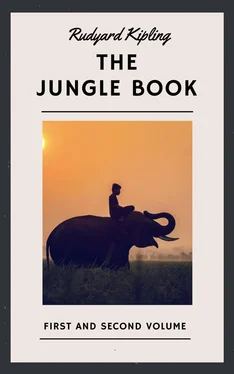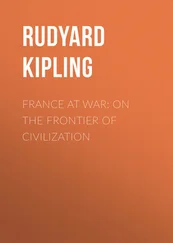1 ...8 9 10 12 13 14 ...17 Generations of monkeys had been scared into good behavior by the stories their elders told them of Kaa, the night thief, who could slip along the branches as quietly as moss grows, and steal away the strongest monkey that ever lived; of old Kaa, who could make himself look so like a dead branch or a rotten stump that the wisest were deceived, till the branch caught them. Kaa was everything that the monkeys feared in the jungle, for none of them knew the limits of his power, none of them could look him in the face, and none had ever come alive out of his hug. And so they ran, stammering with terror, to the walls and the roofs of the houses, and Baloo drew a deep breath of relief. His fur was much thicker than Bagheera’s, but he had suffered sorely in the fight. Then Kaa opened his mouth for the first time and spoke one long hissing word, and the far-away monkeys, hurrying to the defense of the Cold Lairs, stayed where they were, cowering, till the loaded branches bent and crackled under them. The monkeys on the walls and the empty houses stopped their cries, and in the stillness that fell upon the city Mowgli heard Bagheera shaking his wet sides as he came up from the tank. Then the clamor broke out again. The monkeys leaped higher up the walls. They clung around the necks of the big stone idols and shrieked as they skipped along the battlements, while Mowgli, dancing in the summerhouse, put his eye to the screenwork and hooted owl-fashion between his front teeth, to show his derision and contempt.
“Get the man-cub out of that trap; I can do no more,” Bagheera gasped. “Let us take the man-cub and go. They may attack again.”
“They will not move till I order them. Stay you sssso!” Kaa hissed, and the city was silent once more. “I could not come before, Brother, but I think I heard thee call”—this was to Bagheera.
“I—I may have cried out in the battle,” Bagheera answered. “Baloo, art thou hurt?
“I am not sure that they did not pull me into a hundred little bearlings,” said Baloo, gravely shaking one leg after the other. “Wow! I am sore. Kaa, we owe thee, I think, our lives—Bagheera and I.”
“No matter. Where is the manling?”
“Here, in a trap. I cannot climb out,” cried Mowgli. The curve of the broken dome was above his head.
“Take him away. He dances like Mao the Peacock. He will crush our young,” said the cobras inside.
“Hah!” said Kaa with a chuckle, “he has friends everywhere, this manling. Stand back, manling. And hide you, O Poison People. I break down the wall.”
Kaa looked carefully till he found a discolored crack in the marble tracery showing a weak spot, made two or three light taps with his head to get the distance, and then lifting up six feet of his body clear of the ground, sent home half a dozen full-power smashing blows, nose-first. The screen-work broke and fell away in a cloud of dust and rubbish, and Mowgli leaped through the opening and flung himself between Baloo and Bagheera—an arm around each big neck.
“Art thou hurt?” said Baloo, hugging him softly.
“I am sore, hungry, and not a little bruised. But, oh, they have handled ye grievously, my Brothers! Ye bleed.”
“Others also,” said Bagheera, licking his lips and looking at the monkey-dead on the terrace and round the tank.
“It is nothing, it is nothing, if thou art safe, oh, my pride of all little frogs!” whimpered Baloo.
“Of that we shall judge later,” said Bagheera, in a dry voice that Mowgli did not at all like. “But here is Kaa to whom we owe the battle and thou owest thy life. Thank him according to our customs, Mowgli.”
Mowgli turned and saw the great Python’s head swaying a foot above his own.
“So this is the manling,” said Kaa. “Very soft is his skin, and he is not unlike the Bandar-log. Have a care, manling, that I do not mistake thee for a monkey some twilight when I have newly changed my coat.”
“We be one blood, thou and I,” Mowgli answered. “I take my life from thee tonight. My kill shall be thy kill if ever thou art hungry, O Kaa.”
“All thanks, Little Brother,” said Kaa, though his eyes twinkled. “And what may so bold a hunter kill? I ask that I may follow when next he goes abroad.”
“I kill nothing,—I am too little,—but I drive goats toward such as can use them. When thou art empty come to me and see if I speak the truth. I have some skill in these [he held out his hands], and if ever thou art in a trap, I may pay the debt which I owe to thee, to Bagheera, and to Baloo, here. Good hunting to ye all, my masters.”
“Well said,” growled Baloo, for Mowgli had returned thanks very prettily. The Python dropped his head lightly for a minute on Mowgli’s shoulder. “A brave heart and a courteous tongue,” said he. “They shall carry thee far through the jungle, manling. But now go hence quickly with thy friends. Go and sleep, for the moon sets, and what follows it is not well that thou shouldst see.”
The moon was sinking behind the hills and the lines of trembling monkeys huddled together on the walls and battlements looked like ragged shaky fringes of things. Baloo went down to the tank for a drink and Bagheera began to put his fur in order, as Kaa glided out into the center of the terrace and brought his jaws together with a ringing snap that drew all the monkeys’ eyes upon him.
“The moon sets,” he said. “Is there yet light enough to see?”
From the walls came a moan like the wind in the tree-tops—“We see, O Kaa.”
“Good. Begins now the dance—the Dance of the Hunger of Kaa. Sit still and watch.”
He turned twice or thrice in a big circle, weaving his head from right to left. Then he began making loops and figures of eight with his body, and soft, oozy triangles that melted into squares and five-sided figures, and coiled mounds, never resting, never hurrying, and never stopping his low humming song. It grew darker and darker, till at last the dragging, shifting coils disappeared, but they could hear the rustle of the scales.
Baloo and Bagheera stood still as stone, growling in their throats, their neck hair bristling, and Mowgli watched and wondered.
“Bandar-log,” said the voice of Kaa at last, “can ye stir foot or hand without my order? Speak!”
“Without thy order we cannot stir foot or hand, O Kaa!”
“Good! Come all one pace nearer to me.”
The lines of the monkeys swayed forward helplessly, and Baloo and Bagheera took one stiff step forward with them.
“Nearer!” hissed Kaa, and they all moved again.
Mowgli laid his hands on Baloo and Bagheera to get them away, and the two great beasts started as though they had been waked from a dream.
“Keep thy hand on my shoulder,” Bagheera whispered. “Keep it there, or I must go back—must go back to Kaa. Aah!”
“It is only old Kaa making circles on the dust,” said Mowgli. “Let us go.” And the three slipped off through a gap in the walls to the jungle.
“Whoof!” said Baloo, when he stood under the still trees again. “Never more will I make an ally of Kaa,” and he shook himself all over.
“He knows more than we,” said Bagheera, trembling. “In a little time, had I stayed, I should have walked down his throat.”
“Many will walk by that road before the moon rises again,” said Baloo. “He will have good hunting—after his own fashion.”
“But what was the meaning of it all?” said Mowgli, who did not know anything of a python’s powers of fascination. “I saw no more than a big snake making foolish circles till the dark came. And his nose was all sore. Ho! Ho!”
“Mowgli,” said Bagheera angrily, “his nose was sore on thy account, as my ears and sides and paws, and Baloo’s neck and shoulders are bitten on thy account. Neither Baloo nor Bagheera will be able to hunt with pleasure for many days.”
Читать дальше












